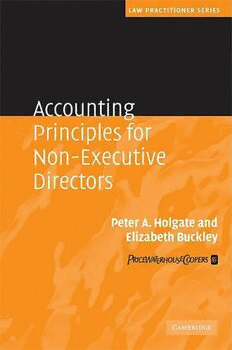Table Of ContentThis page intentionally left blank
AccountingPrinciplesforNon-ExecutiveDirectors
Goodqualitynon-executivedirectorsareessentialtogoodcorporategov-
ernance.Theybringawealthofexperiencetotheboardroom,andtogether
withtheirfellowboardmemberstheyareresponsibleforthecompany’s
annualreportandaccounts.However,fewaretrainedaccountants.
Thisvolumeexplainsthekeyelementsofalistedcompany’sannual
report and accounts. Part I explains the difference between profit and
cash flows, the accounting profession, the international harmonisation
of accounting rules, the origins of the rules governing the preparation
of accounts, the regulation of financial reporting and the overarching
principles behind accounting rules. Part II discusses issues relevant to
listedcompanies:mergersandacquisitions;earningspershare;realised
and distributable profits; financial instruments; and other key topics.
An appendix sets out 50 questions, linked to the chapters, which non-
executivedirectorsmightliketoaskatmeetingsoftheboardandaudit
committee.
peterholgateissenioraccountingtechnicalpartnerwithPricewater-
houseCoopersLLP.Assuch,heheadsthelargestaccountingconsulting
team in the UK. A member of the ASB’s Urgent Issues Task Force, he
is also chairman of the Institute of Chartered Accountants in England
and Wales’ Centre for Business Performance management board and
a member of the advisory board of the ICAEW’s Financial Reporting
Faculty.
elizabeth buckley is a consultant to PricewaterhouseCoopers LLP.
She has worked in the accounting technical departments of two of the
‘Big 4’ accounting firms, and at the ICAEW. She is a member of the
InstituteofCharteredAccountantsofScotlandandofthejointInstitutes’
workingpartyondistributableprofits.
LawPractitionerSeries
TheLawPractitionerSeriesofferspracticalguidanceincorporateandcommer-
ciallawforthepractitioner.Itoffershigh-qualitycommentandanalysisrather
thansimplyrestatingthelegislation,providingacriticalframeworkaswellas
exploring the fundamental concepts which shape the law. Books in the series
covercarefullychosensubjectsofdirectrelevanceandusetothepractitioner.
The series will appeal to experienced specialists in each field, but is also
accessibletomorejuniorpractitionerslookingtodeveloptheirunderstandingof
particularfieldsofpractice.
TheConsultantEditorsandEditorialBoardhaveoutstandingexpertiseinthe
UKcorporateandcommercialarena,ensuringacademicrigourwithapractical
approach.
Consultanteditors
CharlesAllen-Jones,retiredseniorpartnerofLinklaters
Mr Justice David Richards, Judge of the High Court of Justice, Chancery
Division
Editors
ChrisAshworth–LovellsLLP
ProfessorEilisFerran–UniversityofCambridge
TimothyPolglase–Allen&Overy
StephenHancock–HerbertSmith
JudithHanratty–BPCorporateLawyer,retired
KeithHyman–CliffordChance
KeithJohnston–AddleshawGoddard
VanessaKnapp–FreshfieldsBruckhausDeringer
CharlesMayo–Simmons&Simmons
AndrewPeck–Linklaters
RichardSnowdenQC–ErskineChambers
WilliamUnderhill–Slaughter&May
SandraWalker–RioTinto
Foracompletelistoftitlesintheseriesseebackofbook
Accounting Principles for Non-Executive
Directors
PETER HOLGATE AND ELIZABETH BUCKLEY
PricewaterhouseCoopersLLP
CAMBRIDGE UNIVERSITY PRESS
Cambridge, New York, Melbourne, Madrid, Cape Town, Singapore, São Paulo
Cambridge University Press
The Edinburgh Building, Cambridge CB2 8RU, UK
Published in the United States of America by Cambridge University Press, New York
www.cambridge.org
Information on this title: www.cambridge.org/9780521509787
© Cambridge University Press 2009
This publication is in copyright. Subject to statutory exception and to the
provision of relevant collective licensing agreements, no reproduction of any part
may take place without the written permission of Cambridge University Press.
First published in print format 2009
ISBN-13 978-0-511-51778-5 eBook (NetLibrary)
ISBN-13 978-0-521-50978-7 hardback
Cambridge University Press has no responsibility for the persistence or accuracy
of urls for external or third-party internet websites referred to in this publication,
and does not guarantee that any content on such websites is, or will remain,
accurate or appropriate.
Contents
Acknowledgements x
Whichstandardsandlegislationhasthisbookbeenbasedon? xi
Glossaryofterms xii
PartI: Theaccountingenvironment
1. Introduction 3
Aimofthisbook 3
Whatisaccounting? 3
Thecomponentsofacompany’sannualreport 5
Thedifferencebetweenprofitandcashflow 7
Performancestatements 9
Theuseofaccountingtermsinagreements 12
WhatisGAAP? 12
2. AccountingintheUKandtheeffectsofinternational
harmonisation 15
TheUK’sAccountingStandardsBoard 15
Internationalharmonisation 17
TheInternationalAccountingStandardsBoard 18
TheEURegulationforharmonisationwithinEurope 20
ConvergencewithUSGAAP 22
ImplicationsfortheUK 23
Inanutshellwherearewenow? 25
3. Thelegalframeworkforaccounting 26
Introduction:theCompaniesAct1985andtheCompaniesAct
2006 26
TheCompaniesAct2006:accountsandreports 27
ApplicationoftheCompaniesActtoIFRSandUKGAAPcompanies 28
AccountingprovisionsoftheActapplyingtoIFRSandUKGAAP
companies 28
AccountingprovisionsofSI2008/410applyingtoUKGAAP
companiesonly 32
v
Contents
4. Theaccountancyprofessionandtheregulatoryframeworkfor
accountingandauditing 35
Theaccountancyprofession 35
TheFinancialReportingCouncil 36
TheFinancialReportingReviewPanel 39
Auditreporting 40
Theroleofaccountantsincapitalmarketstransactions 42
5. Substanceoverform 44
Formv.substance 44
Earlyexamples 44
Emergenceoftheoff-balance-sheetindustryintheUK 45
FRS5‘Reportingthesubstanceoftransactions’ 45
ExamplesofFRS5inpracticeintheUK 47
ThefutureofFRS5inUKGAAP 50
DoessubstanceoverformhaveaplaceinIFRS? 50
6. Communicatingaccountinginformation 52
Background 52
Summaryfinancialstatements 53
Thecorporatereportingsupplychain 54
Therealityofthe‘earningsgame’ 55
Alternativeperformancemeasures 57
Usersandanalysisofaccountinginformation 58
7. Currenttrendsinaccounting 60
Whyallthechange? 60
Currenttrendsinthinking 62
PartII: Somespecifics
8. Individualentityandconsolidatedfinancialstatements 69
Thedistinctionbetweenindividualentityfinancialstatementsand
consolidatedfinancialstatements 69
Whentoconsolidate 71
Whattoconsolidate 72
Exemptionreholdingcompanyincomestatement 74
Techniquesofconsolidation 75
Associatesandjointventures 77
9. Presentationoffinancialstatements 80
Introduction 80
Statementofcomprehensiveincome 81
Balancesheet 88
vi
Contents
Cashflowstatement 90
Accountingpolicies 91
Notes 93
Individualentityandconsolidatedfinancialstatements:combinedor
separate 93
10. Earningspershare 95
Introduction 95
Summary 95
BasicEPS 96
DilutedEPS 97
AdjustedEPS 98
11. Mergersandacquisitions 100
Introduction 100
Overviewofacquisitionandmergeraccounting 101
ApplicationofIFRS3 104
Goodwillandotherintangibles 108
UKaccountinginoverview 110
Sharepremium,mergerreliefandgroupreconstructionrelief 112
12. Interactionofaccountingwithtax 115
Introduction 115
Accountingprofitanditsadjustment 115
Accountingforcurrentanddeferredtax 117
HMRevenue&CustomsandthemovetoIFRS 121
13. Assets 124
Introduction 124
Definitionofanasset 124
Recognitionofassets 124
Measurementofassets 125
Impairmentofassets 125
Classificationandpresentationofassets 126
Depreciation 127
Disclosure 129
14. Liabilities 130
Introduction 130
Definitionofaliability 130
Recognitionofliabilities 131
Measurementofliabilities 133
Presentationofliabilitiesonbalancesheets 133
Disclosure,includingcontingentliabilities 134
vii
Contents
15. Leases 137
Introduction 137
LeasesunderIFRS 138
LeasesunderUKGAAP 145
Thewayforward 147
16. Pensions 148
Introduction 148
Definedcontributionanddefinedbenefitschemes 148
Accountingfordefinedbenefitschemes 149
IAS19 150
DifferencesbetweenIFRSandUKGAAP 153
Theeffectofpensionsonrealisedanddistributableprofits 154
17. Financialinstruments 156
Introduction 156
Background 156
Definitions 157
Debtandequity 158
Categoriesoffinancialinstrument 161
Amortisedcost 164
Fairvalue 165
Derivativesandembeddedderivatives 166
Hedgeaccounting 167
Recognitionandde-recognition 168
Othermatters 168
Disclosures 169
AccountingunderUKGAAP 169
18. Share-basedpayment 171
Introduction 171
AccountingunderIFRS 172
Trusts 177
Accountingforshare-basedpaymentunderUKGAAP 178
19. Realisedanddistributableprofits 179
Introduction 179
‘Realised’and‘distributable’ 179
Generalrulesondistributions 180
Relevantaccounts 181
Relationshipwithreportingofperformance 183
TECH01/08 184
EffectsofTECH01/08 188
viii

